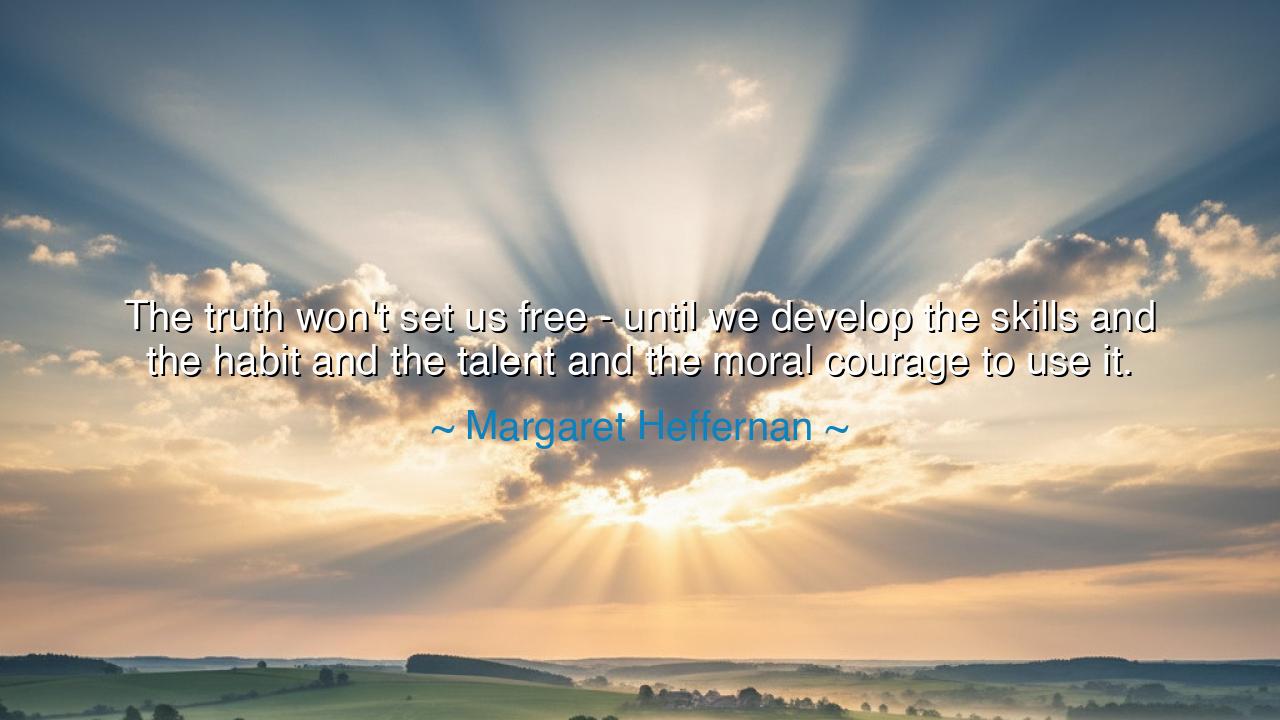
The truth won't set us free - until we develop the skills and the
The truth won't set us free - until we develop the skills and the habit and the talent and the moral courage to use it.






The words of Margaret Heffernan, “The truth won’t set us free — until we develop the skills and the habit and the talent and the moral courage to use it,” echo like a bell struck deep within the chambers of conscience. For ages, humanity has worshipped truth as a divine liberator, a force that dispels the fog of ignorance and grants us clarity. Yet, as Heffernan reminds us, truth alone is but a dormant flame. It is not truth itself, but the will to wield it, that brings liberation. Without courage, truth lies silent, bound in chains of fear, comfort, and conformity.
Consider the wise of old who sought not just knowledge but mastery over self. They knew that to speak truth in a world built upon illusion is to invite trial. To live truth is even harder—it demands strength of spirit, discipline of thought, and a heart unyielding before consequence. Thus, Heffernan teaches us that truth requires cultivation. One must learn the skills to discern it amidst deception, the habit to live by it daily, and the moral courage to act upon it when it brings danger or loss. Knowledge without virtue becomes a hollow monument; truth without action, a useless sword.
In the annals of history, countless souls have glimpsed truth but lacked the fortitude to bear its burden. One recalls the tale of Galileo Galilei, who gazed into the heavens and saw the Earth moving, not the stars. The truth blazed before him like a celestial fire, yet he faced a world that demanded silence. When brought before the Inquisition, he bent his words to survive, but his spirit remained aflame. Centuries later, humanity honored him not for his discovery alone, but for his unyielding courage to seek truth despite oppression. His example reminds us that truth, unguarded by courage, becomes merely a whisper against the storm.
In our own time, truth faces new trials. Lies clothe themselves in sophistication; ignorance wears the garb of convenience. Many see what is wrong, yet turn away, fearing to lose comfort or status. But the freedom that Heffernan speaks of cannot dwell in such hearts. Freedom is not the absence of lies, but the triumph of integrity. To be free, one must be willing to act, to question, to stand firm when the multitude bows. The truth does not set the timid free—it sets the brave apart.
Heffernan’s words also reveal a hidden discipline: that truth is an art, not a mere possession. To use it wisely demands talent—the ability to communicate it without arrogance, to defend it without hatred, and to embody it without pride. The ancients called this the balance of logos and ethos: reason and moral character. A person may know the truth yet destroy others with it; another may wield it as a balm, healing wounds and awakening souls. Only when truth is joined with compassion and wisdom does it liberate both speaker and listener.
Let us, then, learn from this sacred teaching. The path to freedom begins not with revelation, but with preparation. Train your mind to see clearly; discipline your tongue to speak gently but firmly; strengthen your heart to endure isolation when standing for what is right. Make of truth not a weapon, but a torch to guide your steps and light the way for others. As the blacksmith tempers his blade through fire, so must we temper our truth through trial and virtue.
The lesson is eternal: truth demands participation. It is not given to set us free by its mere existence; we must choose to make it so. Each generation inherits both the light and the burden of truth. Whether it liberates or enslaves depends not on the stars, nor on fate, but on our moral courage to use it. For in the end, the truth does not free the world—the truthful heart does.






AAdministratorAdministrator
Welcome, honored guests. Please leave a comment, we will respond soon